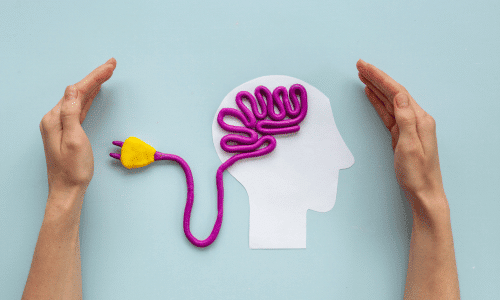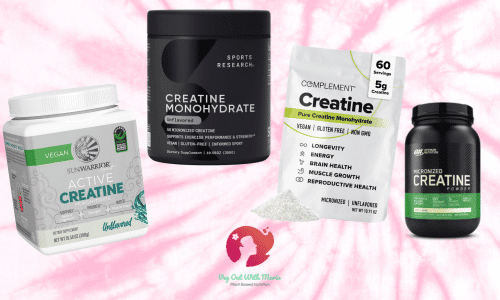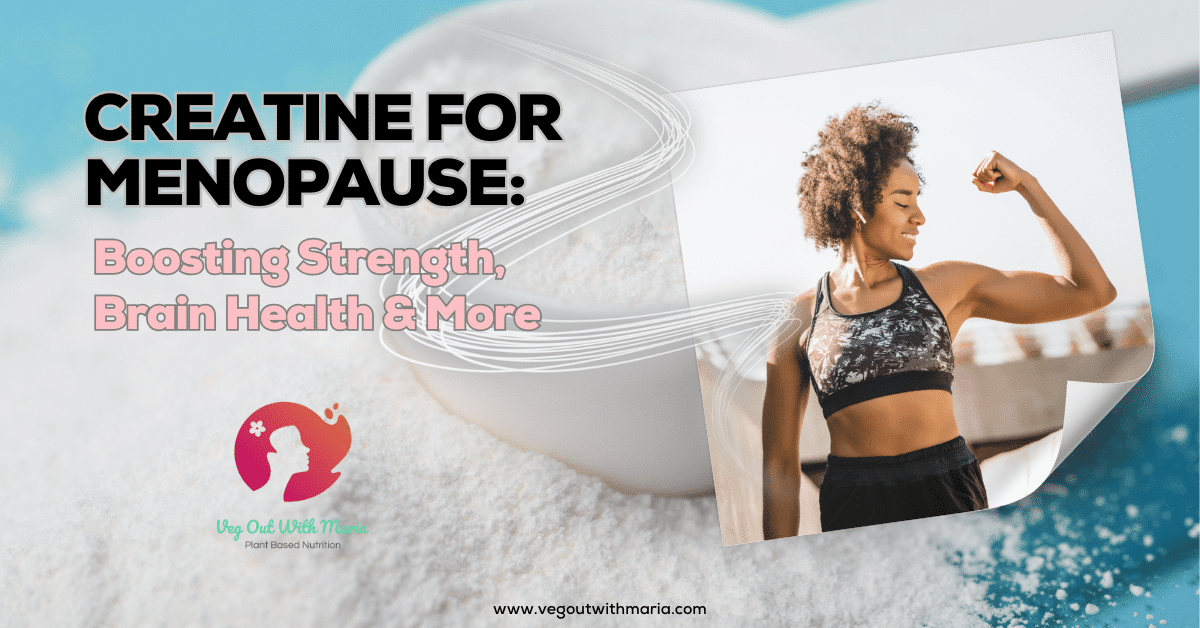Navigating both perimenopause and menopause often brings challenges like muscle loss, reduced energy, and cognitive shifts (hello, where is my brain?!). But what if there was a natural way to combat some of these changes?
While traditionally associated with gym bros and athletes, creatine is gaining recognition for its benefits during menopause, helping to support muscle preservation, mental clarity, and overall vitality. Creatine can be especially valuable for plant-based women, as it’s predominantly found in animal-based foods.
If you’ve heard a lot of talk about creatine lately and are wondering if it’s right for you, this blog post has you covered. We’ll dive into what creatine actually is and why it can be beneficial during menopause (especially if you are plant-based), discuss its safety, and, if you choose to take it, how to take it properly.
What Is Creatine?
Creatine is a compound naturally produced by the body and stored primarily in muscle tissue (about 95%), with a smaller amount stored in the brain. It is synthesized from amino acids (arginine, glycine, and methionine) in the liver, kidneys, and pancreas and plays a critical role in energy metabolism.
Role in Energy Production and Cellular Health
Creatine is vital for producing adenosine triphosphate (ATP), the primary energy currency of cells. During high-energy demands, creatine helps replenish ATP, providing quick bursts of energy for muscles while supporting brain function.
It also contributes to cellular health by reducing oxidative stress and maintaining mitochondrial function.1
Food Sources of Creatine
Dietary creatine is primarily found in animal-based foods like meat, fish, and poultry. However, the body can synthesize creatine from amino acids found in both animal and plant proteins. A balanced plant-based diet can help support creatine synthesis.
Plant-based foods that are rich in arginine, glycine, and methionine include:
- Pumpkin seeds
- Beans, lentils
- Tofu, soybeans
- Hemp seeds
- Quinoa
- Walnuts
- Almonds
- Spirulina
While your body can make a small amount of creatine, there are some known benefits to taking a creatine supplement. This is especially true if you are a plant-based woman in perimenopause and menopause.
Benefits of Creatine During Menopause
1. Muscle Strength
Creatine helps muscles by boosting their energy production and enhancing performance. It works by replenishing adenosine triphosphate (ATP), the primary energy source for muscle contractions, especially during short bursts of intense activity like lifting weights or sprinting. This leads to:
- Increased Strength and Power: Creatine enhances the muscles’ ability to perform high-intensity exercises.
- Improved Recovery: It supports faster recovery between sets or workouts by restoring energy stores.
- Enhanced Muscle Growth: Creatine increases water content in muscle cells, promoting cellular swelling, which may signal muscle growth.
During menopause, reduced estrogen levels accelerate muscle mass loss (sarcopenia) by decreasing muscle protein synthesis, impairing muscle repair, and increasing inflammation.2
Creatine supplementation can help maintain or rebuild muscle mass and strength.3 The key is pairing it with resistance training (lift those weights, ladies!).
2. Brain Health and Cognitive Function
Menopause often brings cognitive changes, commonly referred to as “brain fog,” characterized by memory lapses, difficulty concentrating, and reduced mental clarity. I can attest to this!
These changes are partly linked to declining estrogen levels, which play a vital role in protecting neurons, supporting neurotransmitter activity, and maintaining brain energy metabolism.4
Without estrogen’s protective effects, the brain may experience increased oxidative stress and impaired glucose metabolism, affecting cognitive function. These challenges can be particularly frustrating and affect your quality of life during menopause.
Creatine’s Effects On Brain Health

Creatine supplementation offers a potential solution by enhancing brain energy metabolism. As a key player in the production of adenosine triphosphate (ATP), creatine provides energy for brain cells to function efficiently, especially during periods of high mental demand and stress (e.g., exercise, sleep deprivation).5
This can improve mental clarity, memory, and focus by optimizing energy availability in neurons (cells in the brain and nervous system).6 For those already facing hormonal and metabolic challenges, creatine can be a promising tool to support cognitive health and combat brain fog and even improve mood.
3. Improved Bone Mineral Density?
You would assume that by enhancing muscle strength, creatine can indirectly support bone health, as stronger muscles generate a greater mechanical load on bones, potentially increasing density. But, can creatine really improve bone mineral density? So far, there is mixed evidence of this.
One 2-year randomized placebo-controlled trial took 200 postmenopausal women with osteopenia and randomly assigned them to receive either creatine monohydrate (3 g/day) or a placebo for 2 years. After the 2 years, they found creatine did not improve bone health in older, postmenopausal women with osteopenia. The results also showed that it did not affect lean mass or muscle function.7
The problem with this study is it did not include resistance training and the dose may not have been enough to produce a significant result.
Another 2-year study looking at creatine supplementation during a resistance training and walking program in postmenopausal women showed no beneficial effects on bone mineral density, yet resulted in several improvements at the proximal femur. These changes may provide protection against hip fracture.8
One 12 month study which included resistance training and creatine supplementation (0.1 g/kg/day) did show preservation of femoral neck bone mineral density and a predictor of bone bending strength in postmenopausal women.9
The bottom line is you can’t just take a scoop of creatine powder daily and see results. The key is combining it with exercise and resistance training.
4. Improved Insulin Sensitivity?
Although some studies have shown that creatine can have promising effects on blood sugar and insulin sensitivity, more research is needed to confirm this.10 Stay tuned!
How Creatine Can Benefit Plant-Based Women
As mentioned earlier, your body can synthesize creatine in small amounts from a variety of plant-based proteins. That being said, creatine stores are usually lower in vegetarians and vegans.
Studies suggest that vegetarians may experience a more significant benefit from creatine supplementation compared to meat-eaters due to naturally lower baseline levels of creatine in their muscles.11
A larger increase in creatine stores can lead to improved exercise performance, muscle mass gains, and memory12 for vegetarians or plant-based women taking creatine.
Creatine Supplements

The most commonly used and researched type of creatine supplement is creatine monohydrate. It is widely regarded as the gold standard due to its: proven effectiveness, high bioavailability, safety, and cost-effectiveness.
Be Aware: While many US supplement manufacturers will print “made in the USA” on their labels, the creatine is often sourced from China (and Japan or Korea). China is actually the leading producer of creatine. Concerns have been raised about the quality and purity, with the potential risks of contaminants and heavy metals.
Tip: Look for products using Creapure, a brand name for a specific, high-quality form of creatine monohydrate produced in Germany. One of my favorites is Momentous Creatine* (*as an Amazon affiliate, I earn from qualifying purchases).
Are Creatine Supplements Plant-Based?
Yes, creatine monohydrate is generally considered vegan-friendly because most commercially available creatine supplements are synthetically produced and do not contain animal products. However, always check the ingredients list of your specific creatine product to be sure.
How Much Creatine Should You Take?
The typical recommended dosage of creatine is 3–5 grams per day, which is sufficient to replenish creatine stores and provide benefits for muscle health, cognitive function, and energy.
You may hear that you need a “loading” dose of 20 grams daily, split into four doses for 5–7 days to saturate stores quickly, but this step isn’t necessary for effectiveness.
Does Caffeine Interfere With Creatine?
There is a lot of talk about caffeine interfering with the effects of creatine, but research suggests otherwise. Most studies indicate that taking creatine and caffeine together does not negatively impact performance.13
So, don’t stress about having a cup of coffee and taking creatine simultaneously. If you happen to be taking in a high amount of caffeine, however, I would not take them together to be on the safe side.
Make Sure You’re Hydrated
Staying hydrated while taking creatine is essential because creatine pulls water into your muscles. Proper hydration ensures your body maintains fluid balance and supports creatine’s effectiveness. It also can reduce potential side effects.
So, drink plenty of water throughout the day, especially during and after exercise and when you take your creatine supplement.
Creatine Safety: Concerns & Myths
Creatine is one of the most well-researched dietary supplements and has a strong safety profile. Despite its proven safety, there remain common myths and valid concerns about taking creatine.
Creatine Causes Weight Gain
One common misconception is that creatine causes weight gain. While it can lead to increased water content within muscles in the short term, this is not the same as fat gain.
Bloating and water retention usually only happen when taking high doses (such as the loading dose), and if it does, it seems to diminish after a couple weeks of usage.
Is Creatine A Steroid?
As mentioned before, creatine is a naturally occurring compound found in the body. It is not a steroid and should not increase testosterone levels.
Does Creatine Cause Kidney Damage?
Some worry that taking creatine can cause kidney damage, but research shows that creatine is safe for healthy individuals, when taken at recommended doses.
However, you should know that creatine breaks down into creatinine, a waste product filtered by the kidneys, leading to a higher level of creatinine in the blood. This can falsely decrease glomerular filtration rate (GFR) on a blood test, even if the kidneys are functioning normally, making your kidney function look impaired. This is because the calculation for GFR is based on creatinine levels.
I had forgotten this and was at first surprised when I got my lab results back – until I remembered why. So, if you want accurate lab results, I recommend stopping creatine for at least a week before lab draw. It’s also a good idea to let your doctor know that you are taking creatine.
Make sure to check out the blog: Key Blood Tests For Plant-Based Eaters if you’d like to ensure you’re meeting your nutritional needs.
Caution With Creatine
People With CKD
If you have chronic kidney disease, taking creatine can put more stress on the kidneys and increase disease progression. I have many years of experience working in this field and would not recommend it.
People With Liver Disease or Heavy Drinkers
Interestingly, creatine has been shown to improve non-alcoholic fatty liver disease but worsen alcoholic fatty liver disease.14 So, if you have liver disease or are a heavy drinker, use creatine with caution.
Before starting on any supplement, including creatine, you should always discuss it with your healthcare provider, especially if you have a chronic disease or other health conditions.
Bottomline
Creatine supplementation can offer transformative benefits during both perimenopause and menopause, addressing key challenges such as muscle loss, mood and cognitive decline, energy fluctuations, and bone health.
By helping to support muscle preservation and strength and enhancing brain energy metabolism, it’s a good tool to have in your tool box!
For plant-based women who do not receive adequate dietary creatine from their food, supplementation can be particularly valuable. By eating a variety of plant-based foods (rich in arginine, glycine, and methionine), you can also help support your body’s ability to synthesize creatine.
Remember to stay hydrated and incorporate resistance training to get the full benefits of creatine. As with any supplement, creatine isn’t for everyone. Check with your healthcare provider to see if taking creatine is right for you.



So good!